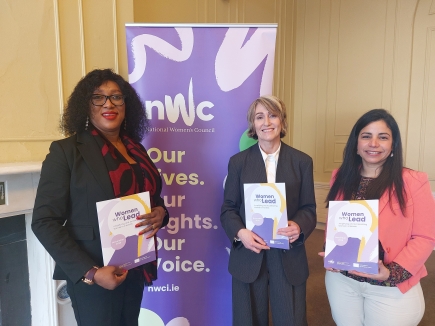Women’s leadership drives progress on gender equality policy
Published: Wednesday, November 05, 2025

National Women’s Council report explores how women’s political representation in Ireland has influenced reproductive rights and gender-based violence policy
Women leaders are more likely to diversify policy agendas, increase their parties’ emphasis on social justice issues, and initiate more family-friendly and feminist policies.
Although still underrepresented in Irish politics, women leaders in parliament, civil service and civil society use strategies including alliance and coalition-building, internally, cross-party and with civil society to advance gender equality.
This is one of the key findings of a new report ‘Women who Lead: Amplifying and Accelerating Women’s Interests’ launched today (5th November) by the National Women’s Council (NWC) which analyses how the increased representation of women at the national level influenced more positive policy outcomes in two key areas: reproductive rights and gender-based violence.
Written by Professor Pauline Cullen, the report is based on the thematic analysis of two case studies: the Repeal of the Eighth Amendment, and the Ratification of the Istanbul Convention alongside the establishment of the State’s domestic, sexual and gender-based violence agency, Cuan. These cases illustrate how women leaders in Ireland have acted as “amplifiers and accelerants” to overcome obstacles and progress women’s interests.
The research also finds that for women leaders to be truly impactful, they require positional and active power – including influence, authority, and access to decision-making spaces, in addition to broader political will and commitment, and supportive male allies.
Recommendations from the report include gender quotas for Local Elections, including mechanisms to dismantle structural barriers and increase representation of women in all their diversity, something which NWC has long advocated for. In addition, the report calls for the implementation of recommendations from key government reports to enable women politicians to lead under safe and equitable conditions.
Professor Pauline Cullen, author of the report, said:
“Women leaders built on decades of civil society activism to push through political inertia. They turned long-standing demands for equality into real policy change. During the campaign to Repeal the Eighth amendment, women leaders acted as “amplifiers” on the issue of access to reproductive rights. They worked together to support a new way to talk about abortion in Ireland in a parliamentary context that moved beyond polarising debates and also progressed the proposed referendum.
With regard to the Ratification of the Istanbul Convention and the establishment of Cuan, women leaders in parliament and Government, civil society and survivors allied together to use parliamentary rules and procedures to push beyond obstacles to ratify international law and implement policy change on tackling gender-based violence.”
Doireann Crosson, Head of Policy, NWC, said:
“The progress on reproductive rights and the fight against gender-based violence show the power of women working together across politics and civil society. To continue the robust collaboration seen in the examples, it is crucial that feminist civil society organisations – across all communities and movements – are fully resourced to continue to advocate and represent women’s interests in public life and politics.”
Liliana Fernandez, Leadership Officer, NWC, said:
“Increasing women’s representation must stay on the political agenda – we need to ensure women in all their diversity can enter, stay, and thrive in politics. Gender quotas are a proven mechanism to do this –we’ve seen that a 40% gender quota has an impact at national level, now let’s see it at local level, combined with other measures to support women in politics.”
‘Women who Lead: Amplifying and Accelerating Women’s Interests’ draws on data from Oireachtas debates, committee hearings, Oireachtas Library Service materials, legislative records, media reports, and accounts from extra-parliamentary actors involved in these policy areas. The report was co-funded by the European Union with the support of the European Women's Lobby (EWL).
The research was launched at an event on which brought together academics, former policymakers, and advocates to reflect on the evidence, discuss the report’s findings, and consider the future of women’s leadership across our political institutions. Professor Pauline Cullen presented the report and this was followed by a panel discussion chaired by Flor MacCarthy, which included speakers, Jan O’Sullivan, Former Minister for Education and Youth of Ireland, Ailbhe Smyth, Feminist and LGBTQ+ activist and one of the leaders of Ireland’s successful campaign to Repeal the Eighth Amendment, Ellen O'Malley Dunlop, Professor, former CEO of Dublin Rape Crisis Centre and Brian Sheehan, CEO, Women for Election.
